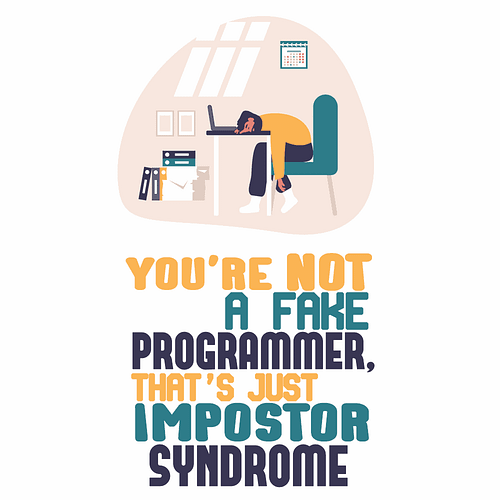Three years ago, I took a deliberate but unnerving step to change careers- from baking(I owned a bakery) to joining the tech space.
Unnerving because everyone was frowning on this newfound ‘passion’ and decision- I mean ‘Why would you even think of changing careers at 28? The world is leaving you behind!’
Well, nonetheless, I started self-teaching Python, and later enrolled in a coding boot camp. One thing was extremely evident though, very few women were in tech. This made my experience even a bit more daunting- I thought to myself, ‘ Am I making the right choice joining a field clearly dominated by men? And this, ladies and gentlemen, is where my imposter syndrome cropped up from.
Determined to finish what I had started, I completed the 25–week boot camp, and one month later, I rejoined the program- but this time as a recruiter. The role gave me an opportunity to do something I was and still am very passionate about; getting more women into tech.
Fast forward to July 2021, I work at a digital media house and can say that I have kinda found ways to overcome the syndrome. Kinda. And because I know it won’t completely go away sometimes, I’m here to share more about what women in tech can do to overcome Imposter Syndrome.
A few months back, I gave a talk to a group of female early-career professionals and a lot of them confessed to having a feeling of inadequacy about their skills, but not knowing what it was.
Well, that feeling of inadequacy is Imposter Syndrome. It is an internal experience of incompetence within one’s self, contrary to evidence and what others think about you. The more you accomplish, the more you feel like a fraud, unworthy, unqualified, and not skilled enough. Unfortunately, women in tech are susceptible to this because we are gravely underrepresented in the tech field. Secondly, our skills, contributions, and competence are often second-guessed, causing us to also doubt ourselves.

The unfortunate truth about fixing imposter syndrome is that it is not the women that are the problem, but the spaces that continue to marginalize us and made us feel less competent.
Based on my personal experience, here are a few tips on how best to overcome the syndrome. You may need to grab yourself a cup of coffee, there is still a bit of reading to do;
1.Mentorship
I often ask myself, why is mentorship underrated? In tech spaces, women are outnumbered and consequently, this means it’s harder to find a role model.
Nonetheless, it is crucial that you find one. My mentor was my brother Andrew- a software developer with over 15 years of experience. He put me in place and reminded me that I was losing sight of the bigger picture whenever the syndrome kicked in.
Share your fears and experiences with your mentor and openly talk about how to continue pursuing your ambitions despite the hurdles.
2. Get Comfortable with Being Uncomfortable
If anything, the tech industry is continuously evolving with so many new languages, frameworks, and tools. Focus on your niche language or framework and work at continuously improving yourself at it.
At some point, I think I was enrolled in about 3 coding academies (I know- #facepalm), and trying to learn JavaScript and Python AT THE SAME TIME; until of course Andrew stepped in to help. He was patient with my learning process.
A number of aspiring coders have confessed to jumping from one boot camp to another because of the fear of going into the real world and exercising their skills- a clear sign of imposter syndrome. Do not be afraid, adopt a mindset of continuous improvement.
3.Avoid Bad Energy
You have no idea how many people told me coding was too hard, or it was a ‘guys thing’ or that I was learning it too late. Surround yourself with people who will “clap for you when you win and raise you up when you fall.”
4.Say “Yes” to opportunities
Taking on new challenges can open up A LOT of doors for you. A LOT. Trust your capabilities and take on career-enhancing opportunities.
5.The Power of Networking
Go to meetups, attend community events, webinars; anything and everything tech-related that could be beneficial to you. Expose yourself and your skillset.
In any case, you will find people within your industry who may be facing the exact issues as you.
5.Tame your Social Media use.
So I woke up one day, unfollowed quite a number of fashion bloggers and lifestyle influencers, and instead hit the ‘follow’ button on more inspirational pages that I could use for learning and personal growth. Not that one shouldn’t follow fashion bloggers and influencers, but I was getting a lot of social anxiety just scrolling through my Instagram feed.
Too much use of social media can worsen imposter syndrome, and make you feel like an underachiever.
Also, encourage yourself with daily affirmations. Again, for emphasis, ‘daily.’
6.Brag Sheet
Document who you are, your skills, and what makes you stand out AND refer to it every single time you feel incompetent.
Famous people and individuals with numerous years of experience can suffer from Imposter syndrome. Don’t beat yourself up if you have it, just work on recognizing the signs, and work towards overcoming it.
I hope I have helped a woman or two in the tech space feel better about themselves. Be patient with your learning journey and don’t be afraid to put yourself out there. Be gentle with yourself, you’re doing the best you can.

